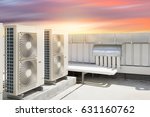Mastering Comfort: The Ultimate Guide to Heating and Air Conditioning
Mastering Comfort: The Ultimate Guide to Heating and Air Conditioning
Blog Article

In today's fast-paced world, having a comfortable indoor environment is more important than ever. Whether it's the blistering heat of summer or the biting cold of winter, effective heating and air conditioning systems are essential for maintaining a cozy atmosphere in our homes and workplaces. As we spend a significant amount of time indoors, understanding how to master these systems can drastically improve our quality of life and well-being.
This guide will delve into the intricacies of heating and air conditioning, providing you with valuable insights on choosing the right systems, ensuring optimal efficiency, and maintaining comfort year-round. By mastering these technologies, you will not only enhance your personal comfort but also contribute to energy savings and environmental sustainability. Join us as we explore the key components and strategies to keep your space perfectly conditioned, regardless of the weather outside.
Understanding HVAC Systems
Heating, ventilation, and air conditioning systems, collectively known as HVAC, are essential for maintaining a comfortable indoor environment. These systems efficiently regulate temperature, humidity, and air quality in residential and commercial spaces. Understanding the components and function of HVAC systems can help homeowners make informed decisions regarding their heating and cooling needs.
The heating component of HVAC systems typically includes furnaces, heat pumps, and boilers, which work to convert fuel or electricity into warmth. Each type of heating system has its own benefits and drawbacks, such as energy efficiency and initial cost. By understanding how these systems operate, individuals can choose the most suitable option for their space and climate.
Air conditioning systems provide relief during hot weather by removing heat and moisture from indoor air. Central air conditioning units distribute cool air through ducts, while window units and portable air conditioners offer more localized cooling solutions. Maintaining a well-functioning air conditioning system is vital for comfort, and regular maintenance can prolong its lifespan and efficiency.
Affordable Home Comfort Solutions Providers
Energy Efficiency Tips
To improve energy efficiency in your heating and air conditioning systems, regular maintenance is essential. Start by scheduling annual inspections for your HVAC units. A professional can clean the coils, replace filters, and check for any issues that may inhibit performance. A well-maintained system runs more efficiently, reducing energy consumption and prolonging the lifespan of your equipment.
Another effective strategy is to utilize programmable thermostats. These devices allow you to set specific temperatures for different times of the day, ensuring that your heating and cooling systems operate only when necessary. For instance, you can lower the temperature while you're away at work and raise it just before you return home. This not only saves energy but also helps maintain a comfortable living environment without overtaxing your system.
Finally, consider adding insulation and sealing ducts to enhance your home's overall energy efficiency. Proper insulation minimizes heat loss in winter and keeps your home cool in summer, reducing the need for excessive heating or cooling. Additionally, sealing ductwork prevents conditioned air from escaping, ensuring that your energy dollars are used effectively. These simple changes can lead to significant savings on your energy bills while keeping your home comfortable year-round.
Maintenance and Troubleshooting
Regular maintenance of your heating and air conditioning systems is crucial for ensuring their efficiency and longevity. Simple tasks like changing air filters every one to three months can significantly improve air quality and system performance. Cleaning the outdoor condenser unit from dirt and debris, as well as checking for any obstructions, can prevent overheating and enhance the airflow. It's also vital to schedule professional inspections at least once a year to address any potential issues before they escalate into costly repairs.
When facing trouble with your heating or air conditioning unit, several common problems can usually be resolved without professional help. For instance, if your heater is blowing cold air, ensure that the thermostat is set to the desired temperature and that the system is in heating mode. If the AC is running but not cooling effectively, check the thermostat and replace the air filter if it appears clogged. Additionally, inspect the circuit breaker to ensure that the system is receiving power.
If basic troubleshooting steps do not resolve the issue, it may be time to contact a professional technician. They can diagnose more complex problems, such as refrigerant leaks or issues with electrical components. Having a reliable technician on hand can save time and ensure that your heating and air conditioning systems are functioning optimally, providing comfort year-round. Regular maintenance and prompt troubleshooting can lead to a more energy-efficient home and reduced utility bills.
Report this page